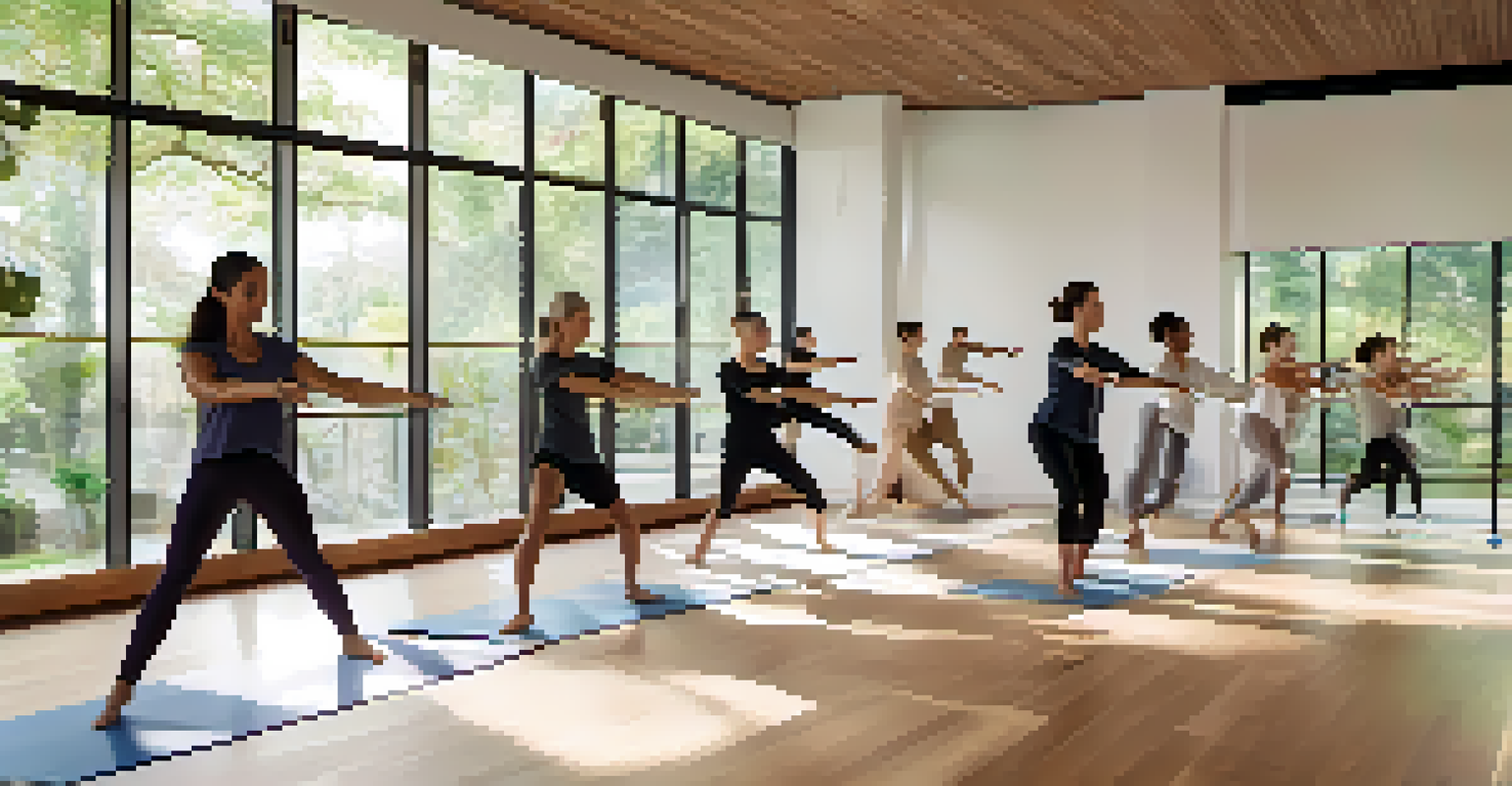Physical Activity Guidelines for Naturopathic Practitioners

Understanding the Importance of Physical Activity
Physical activity is a cornerstone of health and well-being, particularly in naturopathy. It not only boosts physical fitness but also enhances mental health, emotional balance, and overall vitality. For naturopathic practitioners, emphasizing these benefits can help clients understand the holistic nature of wellness.
Movement is a medicine for creating change in a person's physical, emotional, and mental states.
Incorporating regular movement into daily routines can prevent chronic diseases and improve quality of life. This is especially important for practitioners who aim to guide their patients toward sustainable lifestyle changes. The more practitioners embody these principles, the more effective their recommendations will be.
Engaging clients in conversations about their physical activity habits can uncover barriers and motivate them to set achievable goals. By fostering a supportive environment, practitioners can instill confidence in their clients to pursue a more active lifestyle.
Current Physical Activity Recommendations
The World Health Organization recommends at least 150 minutes of moderate-intensity aerobic activity each week for adults. This can be broken down into manageable chunks, making it easier for people with busy schedules to incorporate physical activity into their lives. Additionally, muscle-strengthening activities should be included on two or more days a week.

For children and adolescents, the guidelines suggest at least an hour of physical activity each day. Naturopathic practitioners can play a vital role in encouraging families to prioritize fitness as a fun and engaging part of their daily routine. This might involve exploring various activities that appeal to different age groups and interests.
Physical Activity Boosts Wellness
Regular physical activity enhances not only physical fitness but also mental and emotional health.
It's essential for practitioners to personalize these recommendations based on individual client needs, preferences, and existing health conditions. By tailoring advice, practitioners can foster a sense of ownership in their clients' health journeys.
Integrating Movement into Daily Life
Encouraging clients to integrate physical activity into their daily routines is key to success. Simple changes, like taking the stairs instead of the elevator or going for a brisk walk during lunch, can make a significant difference. Practitioners can help clients identify small, manageable steps toward a more active lifestyle.
The greatest wealth is health.
Mindfulness and movement can also be combined, such as practicing yoga or tai chi, which promote both physical and mental well-being. These practices not only improve flexibility and strength but also foster a deep connection between mind and body. Practitioners should highlight the importance of finding activities that resonate personally with clients.
Creating a supportive community around physical activity can enhance motivation. Whether it’s forming walking groups or participating in local fitness challenges, building a sense of camaraderie can keep clients engaged and inspired.
Addressing Barriers to Physical Activity
Many clients face barriers that hinder their ability to engage in regular physical activity. Common obstacles include lack of time, motivation, or access to facilities. As naturopathic practitioners, it's crucial to identify these challenges and work collaboratively with clients to find solutions.
For instance, if a client struggles with motivation, discussing their interests and preferences can uncover enjoyable activities that feel less like a chore. Additionally, addressing time constraints might lead to the discovery of short, effective workouts that can be done at home or during a break.
Personalized Plans Ensure Engagement
Tailoring activity plans to individual preferences and needs fosters ownership and motivation for clients.
Practitioners should also emphasize the importance of setting realistic goals. By helping clients establish achievable milestones, they can celebrate successes and create a positive feedback loop that encourages continued progress.
The Role of Nutrition in Physical Activity
Nutrition and physical activity go hand in hand, forming a vital partnership for optimal health. Naturopathic practitioners should guide clients on how to fuel their bodies effectively, ensuring they have the energy needed for exercise. A balanced diet rich in whole foods can enhance performance and recovery.
Hydration is another critical aspect that often gets overlooked. Educating clients on the importance of staying hydrated before, during, and after physical activity can prevent fatigue and enhance overall performance. Practitioners can offer practical tips for incorporating hydration into daily routines.
Moreover, discussing nutritional strategies that support muscle recovery and overall health can empower clients to make informed choices. This holistic approach not only enhances physical activity outcomes but also promotes a deeper understanding of the body's needs.
Creating Personalized Activity Plans
Personalized activity plans are essential for ensuring clients stay engaged and motivated. Naturopathic practitioners should consider individual preferences, fitness levels, and health conditions when designing these plans. This tailored approach fosters a sense of ownership and accountability.
Incorporating diverse activities can keep things fresh and exciting. For example, mixing cardio, strength training, and flexibility exercises can cater to various interests and prevent monotony. Practitioners should encourage clients to experiment with different activities to discover what they enjoy most.
Social Support Enhances Commitment
Involvement of friends and family in fitness activities boosts motivation and accountability for clients.
Regular check-ins can help assess progress and make necessary adjustments to the activity plan. This ongoing support reinforces commitment and allows practitioners to celebrate clients’ achievements, no matter how small.
The Impact of Social Support on Physical Activity
Social support plays a crucial role in maintaining physical activity levels. Encouraging clients to engage with friends, family, or community groups can enhance motivation and accountability. Practitioners can suggest involving loved ones in fitness activities, turning exercise into a shared experience.
Participating in group classes or team sports can also create a sense of belonging, making physical activity more enjoyable. When clients feel supported, they are more likely to stick with their fitness goals and overcome challenges that may arise.

Moreover, fostering a positive environment where clients feel comfortable discussing their struggles can lead to meaningful conversations. This open dialogue can help practitioners provide targeted guidance and encouragement, ultimately leading to lasting lifestyle changes.